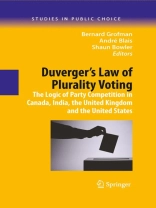Maurice Duverger is arguably the most distinguished French political scientist of the last century, but his major impact has, strangely enough, been largely in the English-speaking world. His book, Political Parties, first translated into English in 1954, has been very influential in both the party politics literature (which continues to make use of his typology of party organization) and in the electoral systems literature. His chief contributions there deal with what have come to be called in his honor Duverger’s Law and Duverger’s Hypothesis. The first argues that countries with plurality-based electoral methods will tend to become two-party systems; the second argues that countries using proportional representation (PR) methods will tend to become multi-party systems. Duverger also identifies specific mechanisms that will produce these effects, conventionally referred to as “mechanical effects”, and “psychological effects”. However, while Duverger’s Hypothesis concerning the link between PR and multipartism is now widely accepted; the empirical evidence that plurality voting results in two-party systems is remarkably weak—with the U.S. the most notable exception.
The chapters in this volume consider national-level evidence for the operation of Duverger’s law in the world’s largest, longest-lived and most successful democracies of Britain, Canada, India and the United States. One set of papers involves looking at the overall evidence for Duverger’s Law in these countries; the other set deals with evidence for the mechanical and incentive effects predicted by Duverger. The result is an incisive analysis of electoral and party dynamics.
Spis treści
Introduction: Evidence for Duverger’s Law from Four Countries.- Voting Strategically in Canada and Britain.- Neither Representative nor Accountable: First-Past-the-Post in Britain.- Strategic Voting in the US.- Mechanical Effects of Duverger’s Law in the United States.- Canada: The Puzzle of Local Three-Party Competition.- Party Inflation in India: Why Has a Multi-Party Format Prevailed in the National Party System?.- Does the United Kingdom Obey Duverger’s Law?.- The United States: A Case of Duvergerian Equilibrium.












